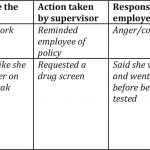The problem of substance abuse has growing implications in the workplace, particularly true regarding opioids. Virtually everyone is touched by this horrific and growing concern. The holidays, including office parties, can be a trigger for many. The intent of this article is to inform and prepare business owners for the potential impact of this seemingly festive season and beyond, with regard to drug use in general.
It has been almost a year since America’s opioid and heroin crisis was declared a national public health emergency. In 2017 the epidemic claimed 64,000 lives. The stunning news is that opioids related overdoses are now the leading cause of death for Americans under the age of 50. In the October, 2017, PBS News Hour reported that “opioids have decimated the American workforce.”
We know from many sources that the dramatic increase in opioid prescriptions over the last 15 years has soared. The statistics tell a deeply troubling story. Sales of prescription painkillers in the U.S. quadrupled between 1999 and 2010.
Christopher Smith, a contributor to U.S. News & World Report, points out that “a third of Americans have been prescribed opioid pain killers and opioids that are so addictive that research suggest that one in five who start a 10-day supply become longer term users. Smith then pointed out “the opioid epidemic has created an enormous financial burden and competitive strain on employers of all sizes – in the form of a diminished labor force, compromised productivity and higher healthcare costs.” One of the most alarming realities is that in 2015 more than $11.5 billion in workers’ compensation costs were directly related to opioid use.
Looking for a clear definition, Opioids: The Truth.com, says, “Opioids is a term for drugs that bind opioid receptors to the body. They include everything from heroin and fentanyl to prescription pills like oxycodone, hydrocodone, codeine and morphine.” To be specific, “more that 115 people in America die every day due to accidental misuse of these drugs – that is, one person every twelve minutes; and the opioid epidemic is the term used to describe this health crisis.”
It is clear that misuse of prescription opioids is a huge part of the epidemic. Congress rarely agrees on anything, but at the end of September 2018 the House of Representatives voted 393 to eight on a bipartisan package to begin addressing this serious national crisis. The formal title of the legislation is The Patients and Communities Act. The goal of the legislation is to boost access to addiction treatment and many other interventions to mitigate the opioid epidemic. German Lopez, a contributor to Vox.com, states that “the big issue seems to come down to money. The legislation makes a lot of legal and regulatory tweaks that will attempt to make addiction treatment more accessible, more difficult for illicit synthetic opioids like fentanyl and carfentanil to slip through the border and boost research on non opioid pain treatments. But it doesn’t pay for a wide expansion of addiction treatment, which is the policy approach that many experts argue, is necessary. In fact, the bill would not provide a significant increase in spending for the opioid crisis at all. Even though it authorizes some relatively small grant programs, the actual funding for those will be decided later on by Congress’s appropriations process. Previous estimates by the Congressional Budget Office suggested earlier versions of the bill would add around $8 billion over five years if fully appropriated — which is still far from the tens of billions a year that some experts say is needed.”
Substance abuse involves more that just opioids in the workplace. Dr. Richard Baum, is President/CEO at CLARITY Behavioral Health, Inc. in Cincinnati, Ohio. The Employee Assistance Program clinical protocols utilized by Procter and Gamble, General Electric and Kroger were developed by Dr. Baum. He answers the following critical questions:
What are some signs an employer should look for to determine if an employee has a substance abuse problem? “As an employer, you never want to police your employees, but you want them to be safe and reasonable. They need to be prepared to do the job you hire them to do. To balance trust and maintain a safe workplace, you need to know as soon as possible if a problem exists. To find out, consider the following: the symptoms of substance use disorders are: (1.) change in appearance, (2.) sudden requests for days off, (3.) increase in mistakes, (4.) unexcused absences, (5.) asking for paycheck advances, (6.) absences the days after getting paid.”
What does an employer do if they suspect someone in the company is using drugs? “Employers don’t want to be parents, social workers or police officers to their employees. To avoid these roles, be sure that your policy and procedure manual has a section on drug use and that the consequences are clear. As an employer, one often discovers drug/alcohol problems through absenteeism, poor work quality and/or deterioration of appearance. When these occur, you want to act quickly. Your action will avoid the risk of injury, damage or losing a valued worker.
Document your concerns using a detailed format such as the following:
If you determine there is some type of problem, bring in the human resource department (or person) to arrange for an evaluation with a professional. DO NOT TRY TO DIAGNOSIS.”
What kind of accommodations can an employer make when dealing with a substance abuse issue? “Employers lose good employees to substance use disorders. In order to encourage treatment, companies have a variety of options. Consider the following:
1. Offer behavioral health and addictions treatment as a part of your health insurance
2. Reduce deductibles on health insurance to make treatment affordable
3. Depending on the size of your organization, have a contract with an addictions specialist or a clinic to provide evaluation and outpatient services. Small companies can contract for services when needed. Larger companies can contract for an employee assistance program.”
What is an Employee Assistance Program (EAP) and should companies be licensed and certified in such a program? “It is a work based intervention program designed to identify and assist employees in solving personal problems (e.g., marital, financial or emotional problems; family issues; substance/alcohol abuse) that may be negatively affecting the employee’s performance. These groups are readily available through healthcare organizations or insurance companies.”
How does legalization of cannabis in some states impact the workplace? “While this will have an effect in states where cannabis is legal, the question in the workplace remains performance based. You want employees who are fully alert. Cannabis remains illegal by federal statute and the long term issues of state federal conflict are not close to being resolved. If you have a drug free workplace contract that reduces your worker compensation premium, you may have to ban substance use to protect this contract.”
Many substance abuse treatment programs are covered by insurance. Figuring out what is or is not covered by your company’s policy for the employee can be complicated and overwhelming. Marshall Glass, is a Staff Development Trainer at Pierce County Alliance in Tacoma, Washington, and a co-founder of Lifecyclerecovery.com, a website that assists in determining the most appropriate treatment options and methodologies for individuals struggling with substance abuse issues. He is currently enrolled in the Clinical Mental Health Counseling Masters Program at Seattle University and offers these important insights: “One of the greatest obstacles preventing individuals from seeking substance abuse treatment is insurance coverage. Differing treatment options exist for individuals with state insurance, private insurance and those who do not have any coverage. The first step in determining treatment placement is researching which options are covered by the individual’s insurance. The financial burden of substance use treatment can be immense and it is therefore important to determine what is financially feasible. Next, when deciding which treatment model and methodology best suit a substance user’s needs, it is imperative to understand the individualized nature of the substance use disorder. Every individual who struggles with physical and chemical dependence on amphetamines, alcohol, cannabis, opioids, as well as other substances, is unique and therefore is in need of a tailored treatment option. It is therefore imperative to research treatment options using a binary approach. Part one of this approach is determining the best fit treatment option while part two is determining which treatment options are covered by the individual’s insurance.”
Stay tuned for Part Two in next month’s issue. I will continue my discussion with Marshall Glass and cover how to navigate the treatment process, “sober” support groups and mental health issues. Businesses will benefit from Part Two, which delves into ways to support employees who are dealing with substance abuse and mental health issues. (Marshall Glass can be contacted at support@lifecyclerecovery.com)


